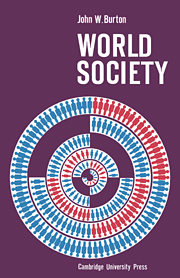Summary
Where is the starting point of analysis of world society? Is it the study of history, of geographical and commercial relations, of particular powerful governments, of international institutions, or of systems? These are all descriptive studies, sometimes involving our personal interpretations. We need to delve deeper into behaviour.
Perceived relationships
Social relationships are perceived relationships. Friendship, cooperation, hostility, envy, anger and aggressiveness are attitudes that are perceived by individuals and groups. The emphasis is on ‘perceived’. What is perceived is not necessarily the attitude that is being displayed. A friendly gesture is sometimes observed and interpreted as open or disguised hostility. Cooperation is sometimes interpreted as a means of acquiring an advantage. In business and in social life one is never quite sure whether one is observing and interpreting behaviour as it is intended to be.
Even a third party who is not directly involved in a relationship cannot be certain about the attitudes of the other parties. Sometimes he can arrange a situation in which he can test the attitudes of those he is observing, and in this way be less doubtful about his observations. Teachers and parents sometimes find themselves in a position in which they have to make judgements about the behaviour of young people, and all they have to guide them is what they are told by others, and what they have observed for themselves in a variety of situations. Their judgements tend to be accepted as valid because they are in positions of authority. Their judgement can, nevertheless, be misleading and false.
Relations between nations and states are of this ‘subjective’ character.
- Type
- Chapter
- Information
- World Society , pp. 55 - 78Publisher: Cambridge University PressPrint publication year: 1972



